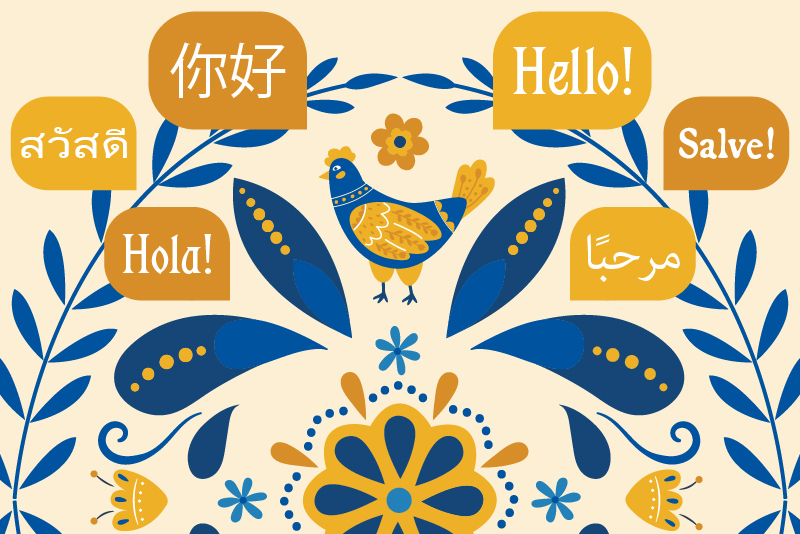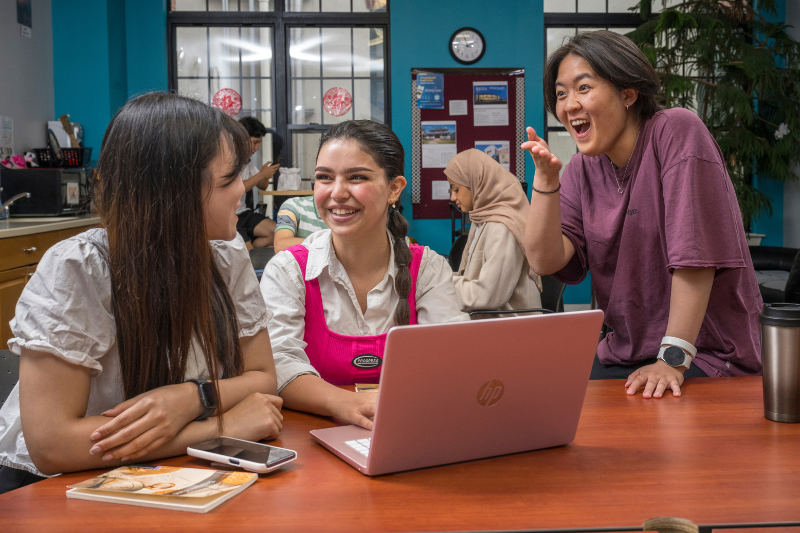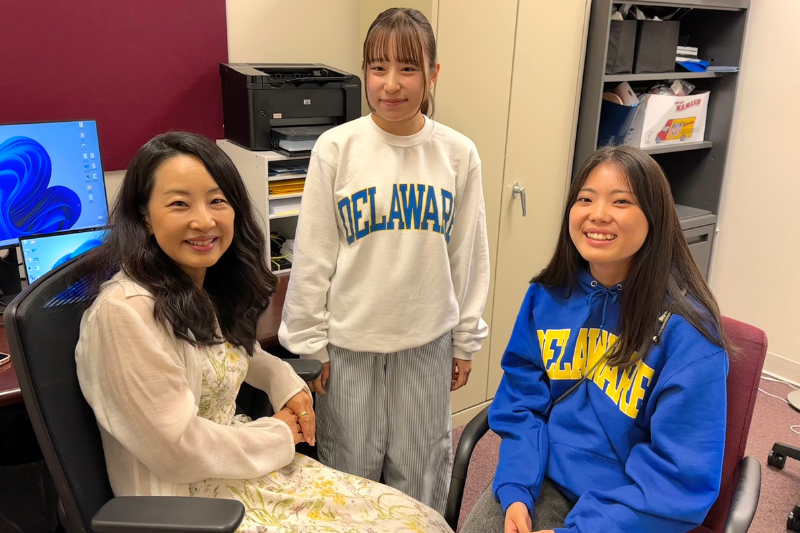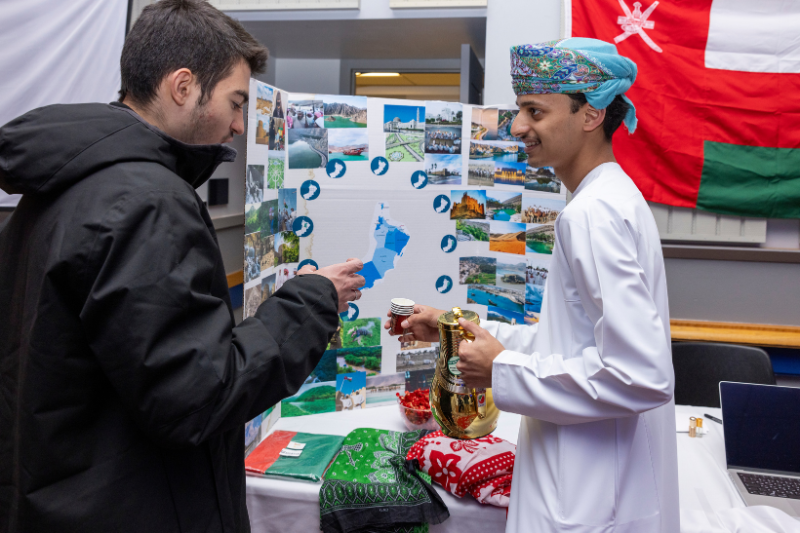
Category: English Language Institute

The ELI Celebrates Multilingualism
November 12, 2025 Written by CAS Communications Staff
The English Language Institute (ELI) has a long history of helping multilingual learners of English overcome language and cultural barriers in order to connect and communicate effectively within English-speaking communities. The ELI’s secret sauce for that success is made from the blending of students, faculty and staff who bring their own ideas, languages, dialects and cultures from around the world to the University of Delaware’s campus. Not only does the ELI celebrate English acquisition, but also the magic moments enabled by multilingualism within its community.
Nigel Caplan, ELI professor and assistant director of teacher-training programs as well director of the master’s of teaching English as a second language program in the College of Education and Human Development, joined the ELI in 2010 and has taught students from about 40 countries who speak roughly 20 different languages, including a number of varieties of English.
“I've had students from Argentina, Lebanon, El Salvador, Afghanistan, Cambodia, Kazakhstan, Belarus, Bahrain, Ghana… We've seen students from most countries,” Caplan said.

Multilingualism among students
While these students speak different languages, they find a way to connect. Caplan has witnessed countless cross-cultural language exchanges over the years, which are a wonderful by-product of the international environment fostered by programs like the ELI.
One common multilingual interaction is Japanese and Chinese students’ discovery of the relationship between written Japanese, Mandarin and Cantonese. The oral languages do not sound the same, but when written, the ideograms often refer to similar concepts.
“Oftentimes, our Japanese students haven't met people from mainland China and vice versa until they come here,” Caplan said. “It's always fun to watch them write something down and realize they both understand it. Since they can share more in the written language than they can in the spoken language, they’ll start talking about the meanings of their names, for example. We often have wonderful conversations about how the characters in Chinese names have a lot of meaning and significance in ways that don't translate into English at all.”
These conversations tend to lead to greater explorations of the similarities and differences across the languages and cultures of other ELI students.
Caplan continued: “Once you start talking about the meaning of names, people from Spanish-speaking backgrounds chime in because they have multiple family names that reflect their mother and their father. This opens up conversations about different naming conventions.”

Multilingualism across faculty and staff
The students aren’t the only ones at the ELI who are multilingual - faculty and staff are too. Spanish, Arabic, French, Farsi, Japanese, Korean, Portuguese and Jamaican Patois are just a few of the languages fluently spoken at the ELI. With a passion for language learning, many team members are proficient in or actively practicing other languages like German, Thai, Catalan, Italian, Chinese, Bulgarian and Vietnamese. A recent poll revealed that the current faculty and staff have lived in 36 different countries, and many were born and raised abroad before moving to the U.S. – just like ELI students!
ELI faculty and staff understand firsthand the hardships that students will face, but they also know the immense personal and linguistic growth that is possible when students embrace their new environment. Students who are nervous about completely leaving their countries behind can also rest assured that someone at the ELI will likely be capable of supporting them in the language in which they feel most comfortable.
Another advantage of the ELI’s diversity is that students are exposed to different varieties and forms of English. As people speak the language slightly differently depending on where they come from, it’s important to expose students to the variations they will encounter after they leave the ELI.
For example, if a student becomes a UD student or works in any kind of multinational context, they will encounter faculty or co-workers who grew up in the southern United States, or Canada, or in Britain or India or China or Mexico and the ELI prepares students to understand all of them.
“It really opens up the students’ minds,” Caplan said. “If they’re going home or they're going to be in what we call an ‘English as an international language’ context, then not everyone will speak like their textbooks.”

Celebrating multilingualism at the ELI
The classroom isn’t the only place the ELI embraces the multilingualism and multiculturalism of its students; events and activities throughout the year do too. While students celebrate American traditions like Halloween or Thanksgiving, the ELI also hosts Lunar New Year celebrations, Iftar dinners, and many other events to showcase the backgrounds of its student body.
Festival of Nations is the ELI’s largest celebration of cultures and a wonderful opportunity to celebrate soft diplomacy at UD. This annual event brings music, traditions, talent and clothing from around the world to UD’s campus, giving students an opportunity to share the best of their home countries’ cultures.
“They are representatives of what they are most proud of, and they get to engage in cultural diplomacy,” said Cheryl Ernst, director of the ELI. “It’s always exciting to travel to a new land and learn while you are there, but our students are also experts and this is an opportunity for them to shine. Global engagement happens throughout disciplines and this is a place to highlight and celebrate our place on the global stage.”
This year, Festival of Nations will help launch International Education Week alongside the Center for Global Programs and Services’ International Coffee Hour event on Friday, November 14, 2025. Both free events will take place in the Trabant Student Center. All are welcome to attend and help celebrate the multilingualism represented at the ELI and the University of Delaware as a whole.
